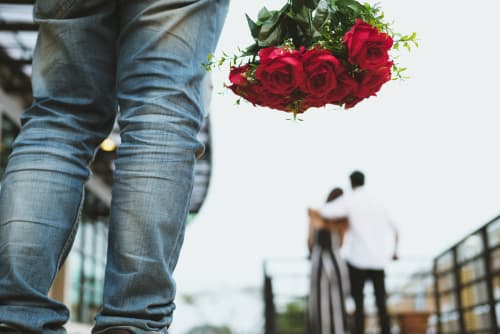Most people have experienced unreciprocated romantic feelings at least once in their lives. It’s a perfectly normal part of everyone’s romantic history. However, it can be very difficult to deal with while you’re in the midst of it. Romantic longing coupled with the feelings of rejection can be very hurtful, emotionally draining, and embarrassing. It can drive you to take actions that appear desperate and confusing.
Unrequited love can sometimes also feel confusing since its signs may not be easy to interpret. It’s also often difficult to get over. If you find yourself asking: “What is love avoidance?” or “Are my feelings unreciprocated?”, you can work through these questions in helpful relationship coaching sessions. It’s important to learn how to spot the signs of unrequited love, cope with the turmoil it may cause, and recover from it emotionally.
What Is An Example Of Unrequited Love?
Unrequited love means that one side in a relationship doesn’t feel the same romantic attraction as the other one. It can manifest itself in different ways, including:
- Being in love with a person who doesn’t feel the same way
- Being drawn to someone who isn’t available
- Feeling attracted to someone while you’re both in relationships with other people
- Still having feelings for your ex who has moved on
- Pretending someone is not who they actually are – living in the fantasy of what they might become and trying harder to make that happen
What Are The Signs Of Unrequited Love?
While you may believe that spotting the signs of unrequited love is simple, they’re often not obvious. Sometimes, your romantic interest may send mixed signals, which could leave you feeling confused. These are a few things that could help you identify unreciprocated love:

- You’re the one reaching out: In a reciprocal relationship, both individuals put in effort and are interested in each other equally. If you feel like your love interest is pulling away from you and not showing interest in communicating, it could be a worrying sign.
- There is no or little physical contact: When individuals are attracted to one another, they both initiate physical contact. In case a person is holding back when you’re attempting to touch them, it’s a clear sign that you have overstepped their boundaries.
- You have an idealized image of them: Very often, in an unequal dynamic such as this one, one person only sees the other one’s qualities to the point of idealization. They’re quick to brush off the other’s character flaws and forgive their hurtful behavior.
- They don’t show interest in getting closer: A person who’s romantically interested in you will actively seek out opportunities to get to know you better. If they don’t eagerly encourage bonding as much as you do, the chances are they’re not interested.
Is Unrequited Love Really Love?
Although it is a kind of love, harboring unrequited feelings is painful and unhealthy because of its one-sided nature. Unlike healthy romantic relationships, which help a person to grow and thrive, it’s a deeply frustrating situation to be in. It can even lead to resentment, inability to move on with your life, and obsessive behavior.
What Does Unrequited Love Feel Like?
If your affection isn’t reciprocated, you probably feel heartbroken. You’ll likely feel intense longing for the other person and possibly even be ashamed of your feelings. However, this could be a chance for you to grow so you can develop into a Healthy Adult and establish healthier relationship patterns from that moment on.
On the other hand, if you’re on the receiving end of unwanted affection, you may be feeling guilty that you can’t reciprocate, annoyed with the person’s advances, and generally uncomfortable about the situation. You may also not know how to reject them without hurting their feelings and self-esteem.
Why Do I Fall In Love With Someone I Can’t Have?
The tendency to pine for people who are unavailable typically stems from emotional wounds from your childhood. People are likely to go back to the things they’re used to even if they’re deeply hurtful. Your early experiences of rejection may have shaped your attachment style, so you could be unconsciously reliving them.
If your parent figures were distant, you may be looking for a similarly detached and indifferent love interest. This childhood abandonment makes many people feel unlovable, and romantic rejection only reasserts this deep-seated, self-sabotaging belief they have.
How Do You Let Go Of Unrequited Love?
Although it may be extremely painful and seem impossible to shake off, you can get over the person and move on to establish a fulfilling relationship with another person. Here are some strategies to try:

- Stop contacting the person, which will give you some distance and allow you to take your mind off them.
- Nurture yourself by focusing on enjoyable activities that do you good, like hobbies and hanging out with friends.
- Avoid seeking romantic relationships for a while. Instead, reflect on what you’re really looking for in a relationship from a whole perspective – spiritually, intellectually, financially, emotionally, and physically.
- Don’t push your feelings under the rug because they could come back to haunt you. Acknowledge them and work through them instead.
- Focus on other people in your life, who will give you much-needed support and keep you thinking about other things.
- Work on changing some negative behavioral patterns. You can reach out to a professional who can help you identify the root cause of your attachment style and help you embrace change.
How To Get Over A Partner With Love Avoidant Traits?
PIVOT helps you achieve healthy relationships through helpful coaching sessions and a personalized, expertise-based curriculum. Our individual coaching program can be an essential step in your self-growth journey. For example, you can learn how to get your new relationship off the ground as well as how to recognize complacency in a relationship or how to preserve your individuality in love.
If you join our 5-day Glass House recovery retreat, you can work through your unhealthy patterns in a small and comfortable group setting. You’ll be provided with individual, group, or experiential sessions along with healthful activities like meditation and yoga. You’ll also have plenty of time to engage in reflection and healing.
Learn more about attachment styles and how you can override your unhealthy patterns to establish successful romantic relationships. Get in touch with us today!